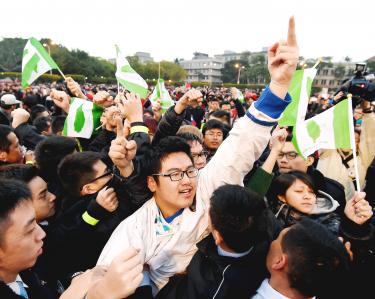Political figures — including Democratic Progressive Party (DPP) Chairperson Tsai Ing-wen (蔡英文) and Taipei Mayor Ko Wen-je (柯文哲) — yesterday criticized the government for postponing a decision on whether to release former president Chen Shui-bian (陳水扁) on medical parole, while activists protested during a flag-raising ceremony in front of the Presidential Office Building in Taipei.
Hopes were high that Chen, imprisoned for more than six years, would be able to go home on New Year’s Eve after an ad hoc medical assessment team on Tuesday recommended that he be granted medical parole.
However, the Ministry of Justice said on Wednesday that it would wait until Monday to decide. It said that because of traffic problems, relevant documents failed to be delivered on time.
“The reason that the ministry gave [for the delay] is not reasonable,” Tsai told reporters after participating in a New Year’s Day flag-raising ceremony in Keelung.
With the news that Chen might be allowed to go home on Wednesday, Lu traveled to Taichung Prison to greet him when he walked out of the prison.
Upon hearing the ministry’s announcement, Lu said she would attend the Taipei flag ceremony.
However, before Lu was able to attend the event, she was rushed to hospital.
Lu’s office said last night that she had ended the hunger strike on doctors’ advice.
“Although the efficiency of President Ma Ying-jeou’s (馬英九) government is something that has long been criticized, the reason that it gave is just non-proportional from a humanitarian point of view,” Tsai said.
“Based on humanitarianism, Ma’s government should accelerate its handling of the former president’s medical parole,” she added.
Ko, a former member of Chen’s medical team, held a similar view.
“The documents could have been sent fax or e-mail in just three seconds,” Ko said at a flag-raising ceremony in front of the Presidential Office Building in Taipei.
What the ministry said “does not sound like a good reason to me,” Ko said.
“My opinion about Chen’s [condition] has been the same from the very beginning: He should be allowed to go home to recuperate,” Ko said. “If the government wants to deal with it, it should deal with it well. It just does not sound like a valid reason.”
DPP Legislator Kuan Bi-ling (管碧玲) echoed Ko’s remarks.
While the ministry said that there are too many documents related to Chen’s medical parole, making the files too large to be e-mailed, Kuan said that government documents are not normally e-mailed, but are sent through a special electronic document delivery system.
“Since 2008, the ministry has delivered more than 1 million pages of documents electronically per year — which is three times the number of hard copies it delivers,” Kuan said. “The ministry’s Agency of Corrections was even honored for its management of electronic documents in 2013. Why did it choose the traditional freeway over the electronic freeway in this case?”
In another reaction to the ministry’s move, a group of activists led by the Alliance of Referendum for Taiwan convener Tsay Ting-kuei (蔡丁貴) clashed with police during an attempt to enter the venue of the flag-raising ceremony in Taipei, demanding the former president’s immediate release.
Blocked by officers, Tsay and the other activists sat down and displayed a pro-independence flag.
They left the venue on their own after the ceremony.
Elsewhere, Chen Shui-bian’s son, Chen Chih-chung (陳致中), said he is disappointed with the ministry’s decision and did not know how to explain the situation to his grandmother.
Meanwhile, former vice president Annette Lu (呂秀蓮) was rushed to hospital shortly after 1am yesterday, three days into a hunger strike.
Lu stopped eating at about 4pm on Sunday in Taipei, vowing that she would not eat until Chen is released.
Source: Taipei Times - 2015/01/02





















